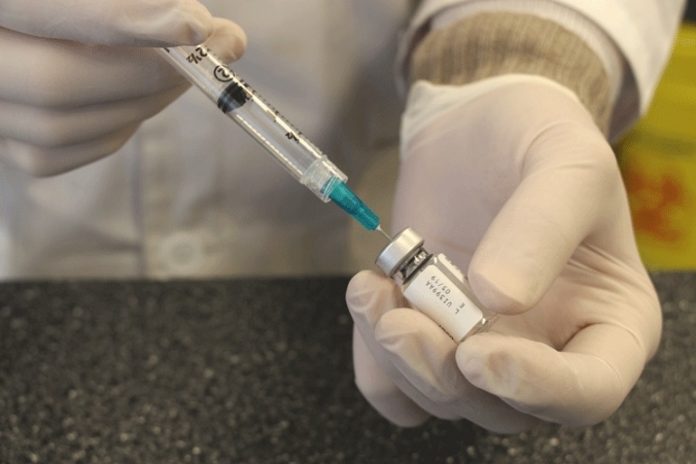
Several residents at a Quebec long-term care home have tested positive for COVID-19 despite being among the first people in Canada to receive the first dose of the Pfizer vaccine.
Seven people at the Maimonides long-term care home in western Montreal “were infected within the first 28 days after their first [vaccine] dose,” the regional health-care authority that oversees the home said in a statement.
The outbreak doesn’t suggest anything new about the vaccine—it was already clear it doesn’t give full protection with a single dose, nor right away—but it is highlighting worries in Quebec, where people are already on edge about the province’s “off-label” vaccination campaign and the contradictory information around it.
Health authorities haven’t yet been able to determine exactly when in those 28 days they believe the residents were infected.
The extra immunity from the Pfizer vaccine doesn’t kick in until about 12 days after the first inoculation. In other words, if the residents were infected within two weeks of getting the shot, that’s no surprise, as they had no extra immunity during that time.
If they got it in the third or fourth weeks, it’s not a big surprise either, as Pfizer maintains the first dose on its own only provides 52 per cent protection. It’s the second dose, the booster shot, that bumps that number up to 95 per cent.
The situation points “to the desperate and immediate need for the second dose,” said Joyce Shanks, whose father lives at the home. Shanks heads a family advocacy group there.
A group of families at Maimonides had already threatened to sue the province over the delay of their booster shots, after the province decided at the end of December to redeploy the doses.
In a campaign to give partial protection to the greatest possible number of people, Quebec is now using those intended second doses as other people’s first doses.
The province hasn’t yet said when it will give second doses. A federal advisory committee said today that it recommended delaying second shots, but only up to an interval of 42 days after the first shot.
People who were vaccinated in the first few days of Maimonides’ vaccination drive are already more than a week overdue for their second shots, according to Pfizer’s schedule.
The Pfizer booster shot is supposed to be given 21 days after the first shot. The first Maimonides vaccinees’ booster-shot date was supposed to be last Monday, Jan. 4.
The seven new cases add urgency to the families’ worries, Shanks said, despite the fact that the cases were “not surprising,” she said.
“There have always been active cases and staff cases [at Maimonides],” she said. “There was never a belief that there would be no new cases… COVID was circulating in the building.”
Families are also well aware that the first dose only offers partial protection on its own, she said. She cited Pfizer’s data, which shows that the first dose offers 52.4 per cent protection.
“No one ever said there was a 100 per cent protection after the first dose,” she said.
In fact, however, some have said something close to this—namely, Quebec authorities and the province’s top medical advisors, who have repeatedly and publicly claimed that the first shot alone gives around 90 per cent protection, contrary to what Pfizer says.
Shanks said she believes the new infections did show up recently rather than in mid-December, meaning the people affected may have had some protection from the vaccine.
They showed up “this past week,” she said, and the home “had tested frequently.”
That still doesn’t confirm much, however, since people could have gotten the vaccines at any time since mid-December.
To date, 84 per cent of residents have been vaccinated and the shots are “ongoing,” said Carl Theriault, a spokesman for the west-central Montreal health authority, in a statement to CTV.
Regarding the new cases, “we are waiting for the results of a public health investigation to understand what happened,” said Theriault.
Positive cases don’t even necessarily mean the person has the virus, said one Montreal expert. After getting vaccinated, pieces of genetic material from the vaccine—not live virus—can be picked up by the “extremely sensitive” tests and lead to a positive test, said Dr. Mitch Shulman.
It’s impossible to become infected with COVID-19 from the vaccine.
“Did they just get a piece of genetic material [and] that doesn’t mean that they’re infected at all?” Shulman said.
“The presence of RNA… in your nose doesn’t mean necessarily that you are sick, doesn’t mean necessarily that you’re infectious, doesn’t mean anything,” he said.
The other Quebec care home to begin vaccinations on the very first day, the St-Antoine home in Quebec City, had a major COVID-19 outbreak throughout December, with dozens infected, after the first round of vaccinations.
That all took place before the province announced it would be delaying the second dose, however, and it didn’t stoke the same questions.
“We expected to find cases among vaccinated workers and seniors, among others, since they received only one dose of the vaccine,” the province’s health department told CTV News in late December.
“The time it takes to develop antibodies in [vaccinated people] was not able to prevent COVID-19 among some residents or workers, as exposure to the virus had already occurred given the outbreak context.”
On Wednesday, Montreal’s top public health officer, Dr. Mylene Drouin, said the province is studying both outbreaks to see if it can learn anything about how elderly vaccine recipients responded to the vaccine—for example, when its immune protection kicked in.
In the Maimonides case, however, “it is too small a number to draw a conclusion,” said Drouin.
She said the Quebec Institute of Public Health is also looking into whether the positive cases are from a new variant of the virus.
“It may be one of the hypotheses, and the [Quebec public health institute’s] laboratories are going to look at this possibility,” said Drouin. “We had a couple of cases of the variant, but it was in a family.”































